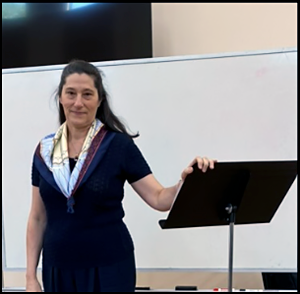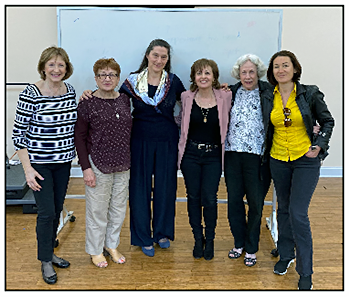Music Educators Association of New Jersey
Serving teachers and students since 1927



Do you have a Safe Sally in your studio who always chooses secure options, pieces nobody else plays, and appears to lack confidence? Or a Hopeless Henry who won’t even look at a new piece because he thinks it’s too hard? We all have probably had these two types of students at some point in our teaching careers. How can you as the teacher replace the negative feelings with positive, self-confident ones?
 Dr. Carol Ann Aicher, teacher of pedagogy at Manhattan School of Music, has some cogent insights. In teaching graduate students of all majors, her approach uses principles and skills that are applicable to every musician and is a specialty that she and her predecessor Vera Wills developed. Unique in the field of pedagogy, she incorporates contemporary educational philosophies and brain-based research into her courses. The curriculum is focused on increasing the students’ understanding of their own learning skills in order to help themselves as well as others. Understanding the learning process allows students to benefit from core thinking and learning skills in solving musical problems, as well as reducing anxiety in performance.
Dr. Carol Ann Aicher, teacher of pedagogy at Manhattan School of Music, has some cogent insights. In teaching graduate students of all majors, her approach uses principles and skills that are applicable to every musician and is a specialty that she and her predecessor Vera Wills developed. Unique in the field of pedagogy, she incorporates contemporary educational philosophies and brain-based research into her courses. The curriculum is focused on increasing the students’ understanding of their own learning skills in order to help themselves as well as others. Understanding the learning process allows students to benefit from core thinking and learning skills in solving musical problems, as well as reducing anxiety in performance.
When asked “What motivates you to practice?” Dr. Aicher’s students answered: 1) scholarships; 2) parents; 3) inner desire (intrinsic motivation); 4) it makes me happy; 5) competitions (extrinsic motivator); 6) do not want to disappoint parents or teacher; 7) it feels good; 8) positive feedback. Sometimes sound itself is the motivator.
What demotivates you? 1) when my parents nag me; 2) repertoire is too hard; 3) not able to win competitions; 4) teachers not helping me improve or not giving me enough time to work on or perfect a piece; 5) negative feedback — what I did wrong.
While extrinsic motivation can jump start a person’s interest, like wanting to win a competition, it’s the intrinsic motivation, the inner feeling of competency and self-efficacy that really counts over time. It’s being allowed to make choices independently that will build confidence and strengthen the ego. Motivation occurs when you enjoy the process, owning what you are doing. Dr. Aicher encourages student self-assessment: “On a scale of 1 to 10, how did you do today?” she’ll ask. It’s always enlightening to hear what they think. Students need to listen to their own playing so they can evaluate themselves. Suggest that they use their phones to record practicing at home or a piece during a lesson.
How many times have your students’ parents asked you, “How did my son do today?” They shouldn’t ask the teacher; rather they should ask their son. He needs to think about how he did and evaluate his own performance. Will that encourage him to do better next time? Hopefully. Even if the student hasn’t practiced, the teacher can always create a positive learning environment. Be FLEXIBLE. It is most important. Listen to YouTube; improvise a duet; play a listening game; work on note recognition.
Let’s look at five different personalities who may attend your piano studio and consider how to engage them in more positive learning.
 Hopeless Henry. Another underachiever, Henry views himself as not succeeding. He won’t look at a new piece because he knows it’s just too difficult. So start small, perhaps practice with him only small sections at a time. Have him set the goals: only four measures? Maybe 8? Create a comfortable environment for him with positive feedback. Be honest and compliment him when he does certain things well. Correct fingering? A nice legato phrase? But be honest, that’s most important.
Hopeless Henry. Another underachiever, Henry views himself as not succeeding. He won’t look at a new piece because he knows it’s just too difficult. So start small, perhaps practice with him only small sections at a time. Have him set the goals: only four measures? Maybe 8? Create a comfortable environment for him with positive feedback. Be honest and compliment him when he does certain things well. Correct fingering? A nice legato phrase? But be honest, that’s most important.The learning environment is fundamentally important. When asked what the qualities of their best teachers are, Dr. Aicher’s graduate students said they were patient, kind and they listened. The teacher/student relationship makes all the difference. It’s what may lead to your greatest accomplishment as a teacher — that your students will enjoy music for a lifetime.
 Carol Ann Aicher surrounded by a few of the meeting’s attendees: (L to R) Charlene Step, Ruth Kotik, MEA President Danette Whelan, Beverly Shea, and Aziza Khasanova-Madaski
Carol Ann Aicher surrounded by a few of the meeting’s attendees: (L to R) Charlene Step, Ruth Kotik, MEA President Danette Whelan, Beverly Shea, and Aziza Khasanova-Madaski
Carol Ann Aicher earned her doctorate of education from Columbia University Teachers College; a Master of Music degree in piano performance from Manhattan School of Music; a piano pedagogy certificate from MSM’s Piano Pedagogy Institute; and a Bachelor of Music degree in piano performance with a minor in music history from Oberlin College Conservatory.
Charlene Step
Writer and Page Designer